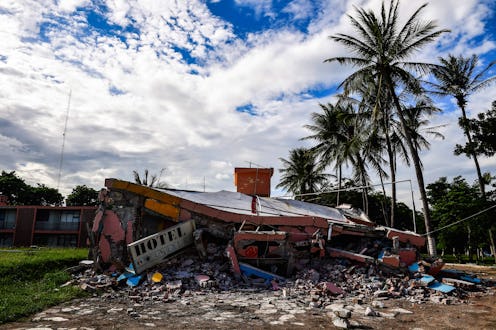
This year's Atlantic hurricane season plundered North America and the Caribbean islands with four remarkably powerful hurricanes. After Hurricane Harvey ransacked Southeastern Texas, Hurricane Irma developed in the Atlantic Ocean, devastated the islands of Barbuda and Antigua, and Katia and Jose followed on its heels. After those hurricanes completed their trajectories, Hurricane Maria left Puerto Rico by Thursday, resulting in parts of the region without electricity. On Saturday, a 6.1 magnitude earthquake shook a state in Mexico — which may have compelled some to wonder if Hurricane Maria and the Oaxaca earthquake were linked to each other.
The thought isn't exactly uncommon or even outlandish. When hurricanes and earthquakes occur in relative succession, those experiencing it may believe that the natural disasters are somehow linked to each other. It's a standard question that people have asked time and again. In 2011, Slate's Brian Palmer asked the same question: are natural disasters linked to each other?
On some level, there could be a bit of weight behind the claim that the two phenomena may be linked to each other. It's based in geography. Some hurricanes, like Hurricane Irma, are so magnificent in terms of their wind power that they register on seismometers — devices that are, by technical design, actually meant to detect earthquakes, not storms. Irma was so powerful that a seismometer began to detect it on its reader. In other words, Hurricane Irma produced seismic quake activity. It would make sense, to a common observer, that a hurricane could technically cause an earthquake, then.
The natural distinction between hurricanes and earthquakes is important to remember to see if the two can be linked at all. These two phenomena develop in vastly different systems and manifest physically in obviously distinct ways. Earthquakes are caused by releases of intense energy from the earth's lithosphere, leading to waves in its plates — the ground under our feet. On the other hand, hurricanes are products of the turbulent mixing between our atmosphere, its temperature, and ocean water. Think of clouds on steroids.
It can be argued that an exceptionally powerful hurricane's winds could be so monstrous and fast that it ends up registering as a seismic event on ground level. In fact, some scholars of natural phenomena have argued that massive hurricanes are able to produce tremors if they are of a specific strength. But so far, there have been no conclusive studies determining the same relation between Hurricane Maria and Mexico's quake.
There is a reason for the lack of definitive say on the matter. Scholars assert that it is unlikely such a connection can be established so easily. The reason for this reluctance to link Hurricane Maria with the Oaxaca earthquake is simply due to the present lack of substantive data that could prove such a proportional relationship, according to experts.
So what kinds of natural phenomena are directly related to hurricanes and earthquakes? You can blame a hurricane for floods or tornadoes while earthquakes are responsible for subsequent tsunamis and mudslides. But they both, at least according to available research, are not exactly and directly linked to each other.
Associate professor Shimon Wdowinski at the Florida International University told Newsweek that studies on linking hurricanes and earthquakes have often been inconclusive due to a dearth of data points on the timing of the hurricane, the following earthquake, intensity of both phenomena, and more.
Perhaps down the lane, scholars might have enough climate data to aggregate in order to understand if there is indeed a correlational or causal relationship between hurricanes and earthquakes. Let's just hope we don't have another Atlantic hurricane season as vicious as this one.